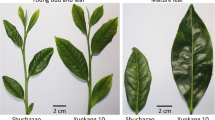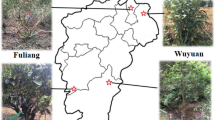Abstract.
The genetic diversity of tea, Camellia sinensis (L.) O. Kuntze, including the two main cultivated sinensis and assamica varieties, was investigated based on PCR-RFLP analysis of PAL, CHS2 and DFR, three key genes involved in catechin and tannin synthesis and directly responsible for tea taste and quality. Polymorphisms were of two types: amplicon length polymorphism (ALP) due to the presence of indels in two introns of PAL and DFR, and point mutations detected after restriction of amplified fragments with appropriate enzymes. A progeny test showed that all markers segregated in a Mendelian fashion and that polymorphisms were exclusively co-dominant. CHS2, which belongs to a multi-gene family, allowed for greater variation than the single-copy PAL gene. Based on Nei's gene diversity index, var. sinensis was revealed to be more variable than var. assamica, and that a higher proportion of overall diversity resided within varieties as compared to between varieties. Even though no specific DNA profile was found for either tea varieties following any single PCR-RFLP analysis, a factorial correspondence analysis carried out on all genotypes and markers separated the tea samples into two distinct groups according to their varietal status. This reflects the large difference between var. sinensis and var. assamica in their polyphenolic profiles. The STS-based markers developed in this study will be very useful in future mapping, population genetics and fingerprinting studies of this important crop species and other Camellia species, as the primers have also proven successful in the three other subgenera of this genus.
Similar content being viewed by others
Author information
Authors and Affiliations
Additional information
Electronic Publication
Rights and permissions
About this article
Cite this article
Kaundun, S., Matsumoto, S. Development of CAPS markers based on three key genes of the phenylpropanoid pathway in Tea, Camellia sinensis (L.) O. Kuntze, and differentiation between assamica and sinensis varieties. Theor Appl Genet 106, 375–383 (2003). https://doi.org/10.1007/s00122-002-0999-9
Received:
Accepted:
Issue Date:
DOI: https://doi.org/10.1007/s00122-002-0999-9




